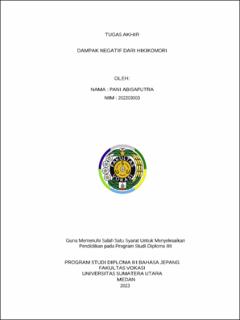Dampak Negatif dari Hikikomori

View/
Date
2023Author
Abisaputra, Pani
Advisor(s)
Barus, Murniati Br.
Metadata
Show full item recordAbstract
Hikikomori is a condition of self-isolation without participating in social activities in
their environment for more than six months. Writing this final project aims to explain
what hikikomori is, the difference between hikikomori and other mental disorders,
the negative impact of hikikomori. The author uses the library method by taking
sources from several books related to hikikomori and mental disorders, journals from
several institutions on hikikomori and articles on the Internet related to hikikomori.
The results of writing this thesis show that there are many teenagers and adults in
Japan who commit hikikomori acts caused by demands and pressures from one's
environment which are felt to be too heavy for hikikomori perpetrators. In Japan
itself hikikomori is one of the factors causing the current decline in the Japanese
population because hikikomori are increasingly popular and practiced by many
people. The hikikomori phenomenon has even become well-known in other countries
due to easy access to the internet. According to the DSM-IV (a diagnostic manual
published by the American Psychiatric Association) hikikomori is not yet considered
a mental illness, but Dr. Tamaki Saito believes that if hikikomori is allowed to
continue, it can trigger the emergence of other mental illnesses for someone.
Collections
- Diploma Papers [43]
